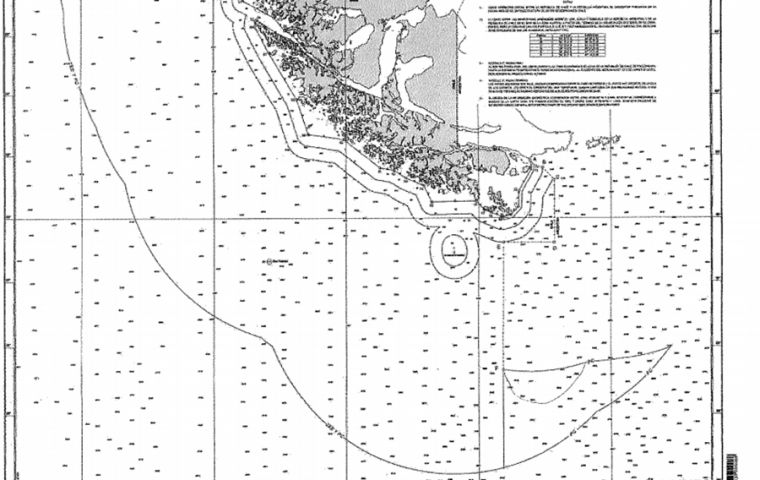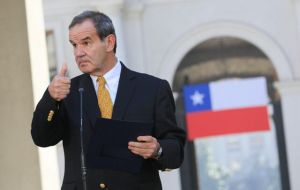MercoPress. South Atlantic News Agency
Chile and Argentina agree to discuss ongoing continental shelf differences south of Cape Horn
 Details of the disputed zone in the extreme south of South America
Details of the disputed zone in the extreme south of South America Chile and Argentina have resurfaced an ongoing dispute over the extent of the continental shelf in the extreme south of the South American continent, but hopefully, both sides have agreed to sit and discuss the issue bilaterally, peacefully and abstaining from any statement and/or action that can hamper the process of a harmonious dialogue.
It all started when Chile updated Nautical Charter 8, which includes some tiny islands in the Drake Passage south of Cape Horn and respective continental shelf, which Argentina claims ownership, since the dispute had been settled following the 1984 Peace and Friendship Treaty, and later backed by the UN Commission on the Limits of the Continental Shelf.
Chilean foreign minister Andrés Allamand, following an exchange of aggressive statements from both sides, on Sunday, downplayed the dispute arguing that the existing difference between Chile and Argentina is one “between countries which enjoy a deep friendship”.
“We are strategic allies and will continue to be. And if in the past, in the seventies, we had conflicting views, both countries have given an example as to how those conflicting positions can be left behind, and how we can build a solid, stable and potent in time bilateral relation”.
Anyhow Allamand said the updating of the controversial Nautical Charter 8 ordered by president Sebastián Piñera and published in the Official Gazette responds to a State policy, “with a historic continuity in the Chilean position and approach”
“In 2009 when Argentina petitioned a half-moon to the extended continental shelf southeast of Point F, Chile pointed out that such pretension was inopinate and made some reservations regarding what it considered its rights.
”In 2016 when the UN Committee on Continental Shelf Limits made a pronouncement regarding Argentina's pretension there was a similar Chilean declaration. Lastly in 2020 when Argentina legally established, with a bill in Congress, the borders on the extended continental shelf, Chile reiterated it was an inopinate action and made a reserve of its rights“
Allamand explained that the historic continuity covered at least three Chilean governments and the current updating is simply a step in that sequence. Furthermore, before publication in the Official Gazette, the Nautical Charter was discussed with former presidents Michelle Bachelet, Ricardo Lagos and Eduardo Frei, plus all the foreign ministers of those administrations.
”They all agreed to support this process“, and also mentioned the support from the current heads of the two congress Houses, plus former diplomats and officials.
Anyhow Allamand emphasized that ”Chile values very positively the existing coincidences between the Argentine and Chilean foreign ministries in that this difference must be solved through dialogue, in line with the historic brotherhood of our peoples and International Law. Likewise, this is what the 1984 Peace and Friendship Treaty mandates“
Nevertheless, Allamand said that Chile wants to establish it does not agree with the Argentine foreign ministry that the updating of Nautical Chart 8 pretends ”to appropriate part of the Argentine extended continental shelf and marine and ocean floors which are the common heritage of humanity“
In the Argentine statement, there is a concept error, nobody appropriates what it belongs to. ”The specific zone or juridical continental shelf up to the 200 miles has always belonged, on the full right, to Chile for the simple reason that we are a coastal state“.
Finally, the minister said that the Chilean foreign ministry believes that the controversy between the two countries in the matter is not pertinent If we have agreed that the difference will be addressed through dialogue, through a discussion process, it is only reasonable to create all the conditions so that this diplomatic dialogue is done in the most harmonious way possible, and thus we will abstain from any action of declaration that can harm the development of this dialogue which we have agreed to”.
The Argentine position, open to dialogue “but in defence of our rights”
On taking notice of the Chilean government updating of the Nautical Charter 8, published in the country's Official Gazette on 23 August, the Argentine government responded with a release supporting its position regarding maritime spaces in the extreme south of the South American continent.
The Chilean announcement pretends to project the continental shelf to the East of meridian 67` 16` 0 which clearly does not coincide with the 1984 Peace and Friendship Treaty celebrated by both countries (*)
The external limit of the Argentine continental shelf in this zone is reflected in Law 27,557, approved 4 August 2020, unanimously by both Houses of the Argentine Congress and promulgated on 24 August 2020.
The Law includes an internal norm from the presentation made by Argentina before the UN Committee on Continental Shelf Limits, CLPC. The presentation fully adjusts to the Peace and Friendship Treaty and was approved with no questions from that Committee to establish a maritime definitive and mandatory limit in conformity with the UN Convention on the Law of the Sea, Convemar. Neither the presentation nor decision of the Committee was objected to by Chile.
The intended measure from Chile pretends the appropriation of part of the Argentine continental shelf and an extended area of the marine and oceanic floors, maritime space which is part of Humanity's Joint Heritage in accordance with the UN Convention on the Law of the Sea.
“Consequently the Chilean pretention is not acceptable by Argentina and poses a situation that will have to be solved through dialogue in the defence of Argentine rights, in accordance with the historic brotherhood of our peoples and International Law”.
Last but not least is should be added that both the Chilean and Argentine governments are not going through their best moments. Social upheaval in Chile in 2019 showed that the so-called Chilean development model was a big set-up of crony orthodox capitalism. Conservative president Sebastián Piñera never recovered his popular support, down to one digit, and had to accept a constitutional reform, in the making, So a little nationalistic drum beating is not bad if history books are to remember Piñera
In Argentina the situation is far worse, to the incompetence in the management of the pandemic, must the added the collapse of the economy following what is described as the longest confinement in the world, plus the usual level of extended corruption. Such is the situation that the hegemonic Peronist movement could lose the coming midterm elections. And in Argentina, the nationalistic spirit is even more intense.
(*) In 1984 thanks to Vatican mediation and negotiations in Montevideo, the Peace and Friendship Treaty between Argentina and Chile was agreed and signed. The initiative and mediation was the result of the 1978 dispute which was impeded from becoming a full military conflict by the direct appeal of John Paul II to the dictators of Argentina and Chile. Argentine armed forces had started to march towards Chile in the extreme south over the sovereignty of disputed islands in the Beagle Channel, and their projection over the Pacific and Atlantic oceans. In 1982 the aggressive Argentine military turned their efforts and preparations into the invasion of the Falkland Islands. Their disastrous defeat to a UK Task Force put an end to the cycle of military governments in Argentina.





Top Comments
Disclaimer & comment rules-

-

-

Read all commentsWhen has Argentina ever adhered to an agreement. They are once again trying to land grab and confirms my prediction that Argentina would attempt to stop Chile exercising their rights. It will then spill over to a political change in the Argentine government in the upcoming mid term elections.
Aug 30th, 2021 - 10:27 am +3They are very good at flexing their muscles and terminating agreements unless it suits them.
An area to watch maybe.
To be fair, difficult with Argentina I know, but the CLCS has signed off on Argentina’s claim there. One of only two areas where they did, the rest of the claim conflicted with already established British claims.
Aug 30th, 2021 - 11:57 am +3Which must have hurt.
https://en.mercopress.com/2016/06/03/delimitation-of-the-argentine-continental-shelf
So, what, are they going to start blowing up guanacos again, when they stray into the minefields? The last time, the pope mediated. This one might be considered partial.
Aug 30th, 2021 - 10:45 am 0Commenting for this story is now closed.
If you have a Facebook account, become a fan and comment on our Facebook Page!